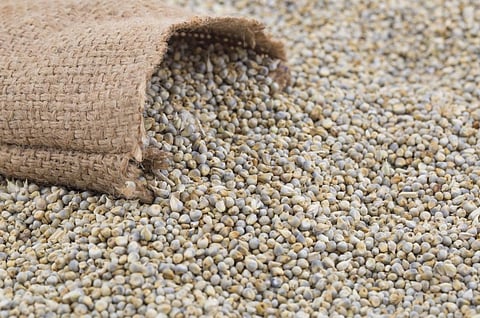

The Parliamentary Standing Committee on Food, Consumer Affairs and Public Distribution recommended that the central government should consider setting up at least one shop initially selling exclusively millets and millet-based products in every district of the country, preferably by Khadi and Village Industries Commission, Tribes India, self-help groups especially run by women.
This initiative, the committee believed, will introduce the variety of coarse grains to the people at one place and will give them liberty to choose coarse grains as per their taste and choice.
The recommendations were made with a view to give impetus to the consumption of coarse grains and millet-based food products and were a part of the 31st report on Food, Consumer Affairs and Public Distribution (2022-23) presented in the Lok Sabha on August 7, 2023.
In one of its earlier reports, the committee had also suggested to the ministry that the beneficiaries of different schemes should be given the option to bundle millets along with wheat and rice within their entitled quantity.
It reiterated in the new report that the government should explore the possibility of distributing millets in addition to rice / wheat under the Targeted Public Distribution System and other welfare schemes (Integrated Child Development Services and PM-Poshan), with a view to encouraging more states to opt for nutritious and healthy millets in combination with rice and wheat.
The Department of Consumer Affairs said it has drawn a roadmap to increase production / consumption / exports and branding of coarse grains / millets. Following this, the government was implementing the National Food Security Mission with the strategy of focusing on low productivity and high potential districts including cultivation of coarse grain and millets in rainfed areas, fallow lands and waste lands, and implementation of cropping system centric interventions.
The United Nations has declared 2023 as the International Year of Millets.
The government, in its reply to the committee, highlighted the challenges in procurement and processing of coarse grains.
The procurement of coarse grains as it relies on factors such as market price, climatic conditions (unseasonal rainfall, among others), stated the Union Ministry of Consumer Affairs, Food and Public Distribution. It added:
In this regard, in Madhya Pradesh, procurement remained low owing to unseasonal rainfall. In Uttar Pradesh and Maharashtra, market price prevailed above minimum support price. In Andhra Pradesh, the market arrivals of ragi are not sufficient and the state is not getting required quantities from the farmers.
Representatives of the Union Ministry of Agriculture and Farmers Welfare also responded, saying primary processing of millets was the major challenge faced by millet farmers.
To address this problem, the Union Ministry of Agriculture and Farmers Welfare is supporting rural farmers through 12 farmer-producer organisations (FPO) for the purchase of primary processing equipment, they said. This is being done with the financial support of NABARD, National Cooperative Development Corporation (NCDC), Small Farmers agri-business consortium (SFAC) and other state government agencies, the representatives added.
The Indian Institute of Millets Research (IIMR), Hyderabad till date assisted 15 FPOs (out of 31 IIMR supported FPOs) to procure primary processing units at Andhra Pradesh, Telangana, Karnataka, Madhya Pradesh, Maharashtra, Arunachal Pradesh and Meghalaya states, the officials said. “This model will strengthen the existing supply chain of millets by engaging farmers into groups as FPOs.”
There has been a marginal increase in sowing of millets in the ongoing Kharif season compared to 2022. This year, 16.42 million hectares area was sown under different coarse grains like jowar, bajra, ragi, maize and small millets. This was an increase of 1.09 per cent compared to 2022, when 16.24 million hectares was sown.